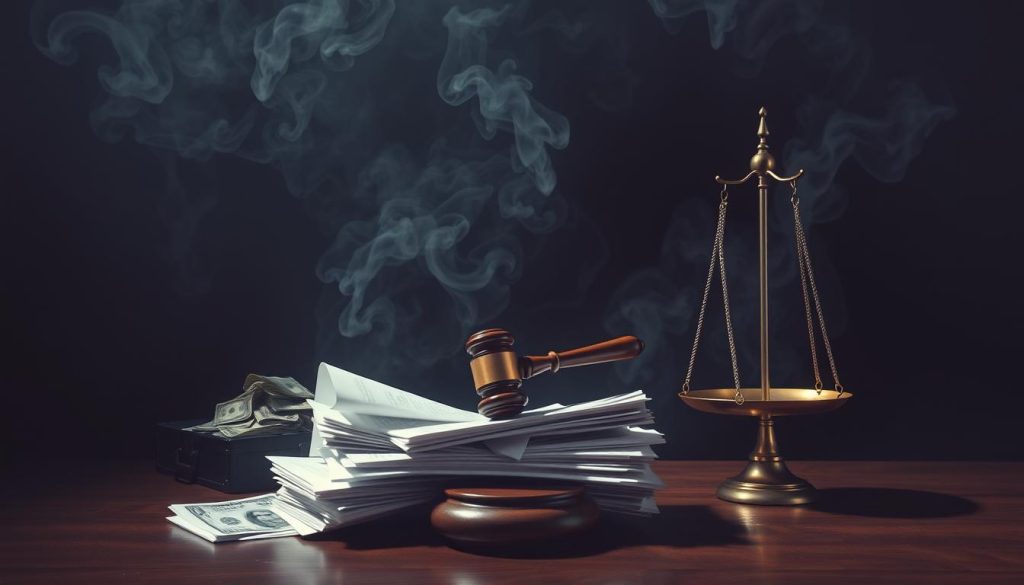In the world of personal injury cases, the legal landscape can be tricky. Injured victims must navigate complex legal procedures and deal with insurance companies. Sadly, some lawyers are taking advantage of their clients. They manipulate the system to keep more of the settlement payouts for themselves.
Personal injury lawyers usually work on a contingency fee basis. This means they only get paid if they win the case. The standard fee is about 33.3% of the final settlement. This setup is meant to help clients who can’t afford legal costs upfront. But, some lawyers find ways to benefit themselves at their clients’ expense.
Key Takeaways
- Contingency fees in personal injury cases are typically one-third or 33.3% of the final settlement amount.
- Lawyers may alter damage reports and settlement amounts to keep more of the payout for themselves, leaving clients with less than they deserve.
- Factors like the severity of injuries, property damage, and insurance policies influence the final settlement amount.
- Insurance companies often offer low-ball settlement offers, and having a lawyer can help negotiate for fair compensation.
- Seeking representation from reputable firms can ensure clients receive quality legal services without upfront payment.
- https://finserviceshub.com/credit-risk-webinars-mastering-the-key-concepts-for-financial-professionals/
Shocking Revelations: Altered Damage Reports by Insurance Adjusters
The insurance industry’s response to Hurricane Ian has been alarming. Investigations have found a disturbing pattern. Insurance adjusters are altering damage reports to lower payouts to homeowners.
This has left many in Florida struggling to rebuild after the storm.
The Rapkin Family’s Nightmare with Heritage Insurance
The Rapkin family’s home was severely damaged by Hurricane Ian. The first adjuster, Jordan Lee, said the house needed to be rebuilt, costing $231,368.57. But later, the insurance company said repairs would only cost $15,000.
Lee said the company changed his report without telling him. They removed important details about the damage.
Whistleblowers Expose Systematic Fraud
The Rapkins’ case is not unique. Many insurance adjusters have come forward as whistleblowers. They reveal that companies are altering reports to lower payouts.
Adjuster Ben Mandell said 18 out of 20 reports he wrote were changed. He claimed this “systematic criminal fraud” is happening across many companies in Florida after Hurricane Ian.
“This is not just one insurance company. This is across the board. It’s systematic criminal fraud.”
These actions have left many homeowners in a tough spot. They are struggling to rebuild their lives and homes. The insurance industry must be held accountable for its actions.
settlement scam stories: Deceptive Practices and Financial Scams
The insurance world is filled with scams and tricks that cheat people out of fair settlements. Recent checks have shown that some adjusters change damage reports and leave out important details. They also offer much lower payouts than the damage really needs.
The Rapkin family’s fight with Heritage Insurance shows how far insurers will go to avoid paying. After a big storm, the adjuster took out key damage info. This led to a settlement offer that was thousands short of the repair costs. Whistleblowers have also shown that some insurance companies cheat by paying less than they should, counting on people not having the money to fight back.
These scams are not rare. A big settlement between Biogen and the U.S. government showed kickbacks to doctors for pushing MS drugs. Insurers like Biogen also made more money by making Medicare claims look bigger. The U.S. Department of Justice has sued big health insurers for sending in too-high bills and over-diagnosing patients.
| Deceptive Practice | Financial Impact |
|---|---|
| Altering Damage Reports | Thousands less in settlement offers |
| Inflating Diagnostic Codes | Billions in fraudulent profits |
| Submitting Inflated Bills | Millions in overpayments by federal health programs |
The size of these deceptive practices and financial scams is huge. For example, Ilya “Dutch” Lichtenstein and Heather Morgan could get over 20 years in jail for scamming the U.S. out of $3.6 billion. These settlement scam stories show we need better protection and rules in insurance and healthcare.
Legal Battles and Consumer Protection
Attorney Steven Bush’s Fight for Justice
Attorney Steven Bush is a former public adjuster now fighting for justice. He represents whistleblower insurance adjusters and policyholders. Bush says insurance companies play the odds, hoping many will accept low offers without a fight.
He has found evidence of these tricks in six states, not just Florida. Bush is determined to show how insurers manipulate damage reports and deny payouts. His work to protect consumers has made him a strong opponent of insurance industry wrongdoings.
“Insurance companies are counting on many consumers to simply accept the reduced settlement offers rather than engage in lengthy legal battles.”
Bush’s hard work has earned him respect from his peers and the community. He’s dedicated to uncovering the truth and making sure insurance companies are held accountable. Bush is committed to making sure consumers get fair treatment and the compensation they deserve.

Regulatory Violations and Misleading Offers
In the world of insurance and legal settlements, consumers face many challenges. These include regulatory violations and misleading offers. These actions can cause financial harm and erode trust in the system.
Acadia Healthcare Company is a prime example. It agreed to pay $16.6 million to the U.S. and $3.1 million to states. This was to settle claims of regulatory violations. The company was accused of billing for services that didn’t meet federal and state rules.
Consumers also deal with misleading offers. For instance, Credit Karma was fined $3 million for lying about credit card approvals. About a third of applicants were denied, even though they thought they’d get approved.
- Credit Karma gathered over 2,500 data points on each person, including financial info, to send targeted ads.
- The Federal Trade Commission can fine up to $46,517 for each violation of the consent order.
- The order against Credit Karma bans them from lying about credit approvals and requires them to pay $3 million to consumers.
These cases highlight the need for consumer protection. It’s crucial to be aware of insurance scams and legal settlements. By staying informed and fighting for their rights, consumers can protect themselves from these misleading offers and regulatory violations.

Conclusion
The “settlement scam stories” in this article reveal a disturbing trend. Lawyers and insurance companies are taking more money for themselves, leaving less for those who need it. They use fraud and alter documents to do this.
These scams are not just in Florida, but also in other states. It’s important for consumers to stand up for their rights. Many insurance companies count on people not wanting to fight for their money. We need stronger laws to stop these scams.
Recent cases show the seriousness of these issues. A title agent was sentenced to 36 months in prison and had to pay $6,634,750 in restitution. Scammers also target Australians, with one couple losing $48,925. We must focus on protecting consumers from these scams.
FAQ
What percentage do personal injury lawyers typically take from settlement amounts?
Personal injury lawyers usually take one-third or 33.3% of any settlement. They only get paid if the case wins. This is called a contingency fee.
How do lawyers calculate the final settlement amount?
Lawyers consider many factors to figure out the settlement. These include the injury’s severity, lost wages, and pain and suffering. They might use special methods to ask for more money.
How have some lawyers altered damage reports and settlement amounts?
Some lawyers change damage reports and settlement amounts. This way, they keep more money for themselves. Injured clients often get less than they should.
What did the Rapkin family experience with their insurance company’s damage report?
The Rapkin family’s home was badly damaged. The adjuster first said it would need to be rebuilt. But later, the insurance said it would only cost ,000 to fix.
What did the insurance adjusters reveal as whistleblowers?
Whistleblower adjusters like Ben Mandell said 18 out of 20 reports were changed. They left out damage on purpose. This fraud is happening in many Florida insurance companies after Hurricane Ian.
What other types of settlement scams and deceptive practices have been reported?
There are many scams and tricks in insurance and legal settlements. These include fake government calls, job scams, and fake legal services. There are also scams with the diversity visa lottery and student programs.
How is attorney Steven Bush fighting against these settlement scams?
Attorney Steven Bush is helping adjusters and fighting for policyholders. He says insurance companies try to win by offering low settlements. They count on people not to fight back.

